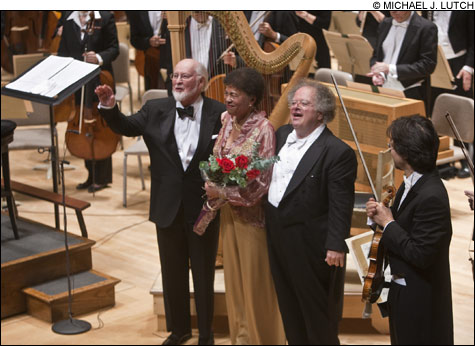
BRAVOS AND A BOUQUET: Retiring BSO principal harpist Ann Hobson Pilot deserved both. |
Has the New Incivility reached the Metropolitan Opera, or have American opera lovers simply acquired enough confidence to boo a production they hate? I wasn’t there, but the opening-night dissatisfaction with the Met’s new Tosca was widely reported. James Levine, who conducted, got the best reviews, though the maestro missed the next performance four days later because of a herniated disc that, it’s been announced, will require surgery. In between, he was in Boston garnering cheers at “Opening Night at Symphony.”
Even Russian keyboard superstar Evgeny Kissin was cheered, though his facile celebrity performance of Chopin’s Piano Concerto No. 2 was an emotional void. His encore, one of Liszt’s breathtaking expansions of Schubert waltzes, Soirées de Vienne, had at least some visceral energy, though a bizarre sense of Viennese rubato (those unmarked expansions of note values).
Sporting her own impressive technical bravura, Ann Hobson Pilot, the BSO’s recently retired principal harpist of the past 40 years, returned as a guest artist to play the premiere of a concerto John Williams composed in her honor, Of Willows and Birches. One movement evoked the melancholy of Psalm 137 (“We hung our harps upon the willows”), sounding more Chinese and Debussy-like than Hebraic; the other suggested more a jazzy, Ravel-like syncopation than Robert Frost’s American-pastoral “Birches” (“One could do worse than be a swinger of birches”). It was, however, a terrific showcase for Hobson, and pleasant enough without ever taking us anywhere. And Hobson deserved the bouquet and the bravos. (She’ll repeat the Williams this Saturday, October 3, on a more various and adventuresome BSO program for which, following Beethoven’s Fourth Symphony, she’ll also play Debussy, Ravel, and Elliott Carter.)
Levine led an exuberant and ravishing Berlioz Roman Carnival Overture (thanks especially to Richard Sheena’s expressive English-horn solo — what an invaluable player he’s become) and a sun-blinding, restless, forward-moving Debussy La mer.
I wish Kissin had attended Russell Sherman’s standing-room-only free concert at Jordan Hall to hear how expressive and surprising Chopin can be. Sherman played Préludes by Debussy (Book II) and Chopin (Opus 28). Debussy’s seemed all character, dark, even sinister, slippery (“Ondine”), witty (“Hommage à S. Pickwick Esq. P.P.M.P.C.” with its inflated opening, a mock-solemn “God Save the King”), and ruminative (“Canope,” a searching meditation on mortality, the name referring to Egyptian canopic jars). The Chopin was all emotion, elegiac (the famous E-minor Largo, the heartbreakingly slow A-major Andantino), urgent, a persistent melancholy underlying even the brightest pieces. They felt very personal. Over the past three years, Sherman, now 79, has lost his brother and three dear friends in the music world: writer Michael Steinberg, composer Leon Kirchner, and conductor Craig Smith, who was once Sherman’s student. Was their loss, and maybe others, the backdrop for the Chopin? Each set seemed a kind of dramatic monologue, and it was all capped by Chopin’s complex F-sharp Nocturne as an encore. The New England Conservatory’s rich-sounding new Steinway — chosen by a team of distinguished pianists including Sherman, couldn’t have had anyone better to inaugurate it.
(And after continual outcries from audiences and critics, the ugly block-letter “NEW ENGLAND CONSERVATORY” sign at the back of the Jordan Hall stage has been replaced by a stylish new logo and a more elegant typeface.)